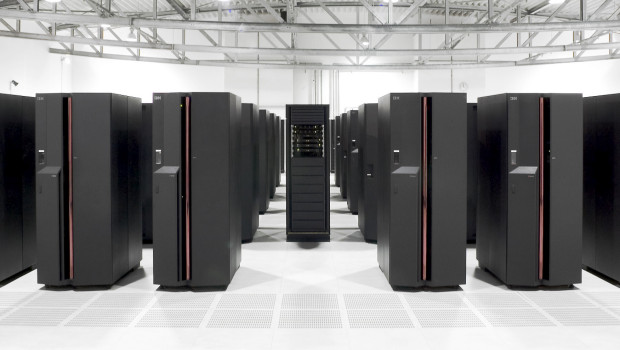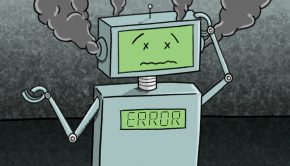Are Computer Games Really Conscious?
The world was stunned in May 1997 when Deep Blue, a chess programme running on a high-powered computer, defeated world champion Gary Kasparov in a six-game series. How could a manmade machine excel the human mind itself? Is it intelligent? Is it conscious? Can it think? These are some of the questions that arose in the minds of many.
The question raised above can be answered by understanding in terms of certain distinctions between what computers and humans are good (or bad) at. The human weak point lies in calculation, while the computer’s is in long term strategy. Suppose that the number of possibilities per move that the computer need consider is p, on the average; then for a depth of m moves, there would be about p^m alternatives for it to consider. If the calculation of each alternative takes a time t on the average, say, then the total time T needed to calculate to the depth m is given by the following formula:
T = t x p^m
The number p comes out to be 136 for the computer to consider (28 possibilities for queen, 28 possibilities for 2 rooks, 28 possibilities for 2 knights, 28 possibilities for 2 bishops, 16 possibilities for 8 pawns and 8 possibilities for the king), which enables the computer to calculate to a considerable depth in the available time, infact to about 10 moves (m = 10).
As pointed out above, human mind takes long time in calculation, while the computer running on a very high speed processor (2.8 Ghz), can drastically cut down this computation time t (Deep Blue calculates at 200 million moves per second, Kasparov, according to IBM statistics, three), however, by judgements and understanding, a human need not consider all the possible moves for a given depth m. For example, a human will never consider the possibility of moving the queen to a place which is already occupied by, say, a pawn.
Thus for a given reasonably large T, the human act of reducing the ‘effective p’ (where humans are good at) makes much more difference in acheiving a large m in the formula than does making the time t very small (which is what computers are good at). As we see, in the game of chess where p is 136 and for a given time m is 10, p^m, which is extemely large number and can be cut down drastically by reducing p by proper judgement and understanding which is present in human but which is what exactly the computer lacks – the conscious mind for the judgements and understanding.
However, for a small T (When the time limit for the game is small), it is making t very small that can be more effective ( since the m values of relevance are likely to be small and p^m will not be very large). This is why computers are good at short but not long chess problems, and why they have a relative advantage with short time limits for play.
The essential point here is that the quality of human judgement and understanding, which springs from consciousness, is an essential thing that the computer lack.
O son of Bharata, as the sun alone illuminates all this universe, so does the soul, one within the body, illuminate the entire body by consciousness – Lord Krsna [Bg 13.34]
Artificial Intelligence (AI)
A sceptic may argue that while the arguments hold for normal algorithms, they may be invalid in the case of Artificial intelligence (AI) algorithms. Typically, in AI algorithms, the rules of operation are not defined in a clear-cut manner beforehand. Rather, a procedure is laid down where the system “learns” and improves its performance based on its “experience”. Hence, typically, AI systems have a repository or a database and have a learning algorithm, which will enable the system to improve its basic algorithm incrementally with every additional entry into its repository. To illustrate the working of as AI algorithm in the context of Deep Blue and Kapsarov, in a well designed AI system, if Kasparov were to defeat Deep Blue in a particular game and tried making the same moves in the next one, Deep Blue would not respond in the same way as it had done in the game it lost. It would have “learnt” from the past experience and hence would react differently the next time.
The question now arises as to whether such a system actually simulates true intelligence and learning? The answer to that question is “No”. This is because an AI algorithm is just taking the computational process one step further. It is not doing anything more than that. Instead of having one static algorithm, it has two – the learning algorithm that updates another operational algorithm based on accumulated data. This ultimately boils down to the same kind of a computational mechanism that we encountered in the earlier cases. This in itself does not constitute “intelligence”.
Proving that Consciousness is not a “Computational” Activity
In mathamatics, a theorem is considered valid if it applies in all case and invalid if it fails for any specific case. So if we could show that consciousness is not an algorithmic activity, ie. if we can do something non-computational with our minds, in some specific context, then it will suffice to prove that consciousness can’t be simulated on a computer.
Now, let’s consider the following Diophantine equation (the polynomial equations, in any number of variables, for which all the coefficients and all the solutions must be integer):
6w + 2x^2 – y^3 = 0; 5xy – z^2 + 6 = 0; w^2 – w + 2x – y + z – 4 = 0;
When solved, the soultion comes out to be: w = 1; x = 1; y =2; z= 4;
Now consider another Diophantine equation:
6w + 2x^2 – y^3 = 0; 5xy – z^2 + 6 = 0; w^2 – w + 2x – y + z – 3 = 0;
This equation has no solution (because by its 1st equation, y must be even, by 2nd equation z must be even also but this contradicts its 3rd equation: whatever w is, because w^2 – w is always even, while 3 is an odd number).
The first equation can be solved by writting a computer algorithm, which just slavishly tries all set of integers one after another and after certain trials, it will tell: w = 1; x = 1; y =2; z= 4 is the solution. When 2nd equation is given to the same algorithm, it will never halt for it will not get any combination of numbers which solve the equation.
While human being using his concious brain can easily tell whether such an equation has solution or not but no computer algorithm including artifical intelligence can do this. If consciousness could be simulated on a computer, then there must exist a computational algorithm for the above mathamatical problem, which could tell in yes/no that such numbers can exist or not.
Russian mathamatician Yuri Matiyasevich demonstrated that there can’t be any computer algorithm which decides yes/no systematically to the question of whether a system of Diophantine equation has a solution.
The consciouness can not be simulated not only be computational method but by any physical, neural, biological or mechanical method also, for it is not a product of anything material but is a symptom of the spirit soul which can’t be created anyway.
The soul is unborn,indestructible, eternal and immutable. He can never be cut into pieces by any weapon, nor can he be burned by fire, nor moistened by water, nor withered by the wind – Lord Krsna[Bg 2.21,23]















This is a strawman argument. No one ever claimed that the rule based algorithms that played chess were conscious.
Neural networks, on the other hand, are likely to evolve into something that is closer to human intelligence. But even this is very far off. With only a very basic simulation of the neural networks in computers, we are now achieving surprisingly good results.
Things like this can’t be mathematically be proven because there isn’t one way to do these things. We are continuously coming up with new methods.
Hare Krishna Dan
You have no idea, you are saying perhaps, maybe in the future… But at the moment we do not know…
The idea of using neural networks to imitate intelligence will fail. That is based on the misunderstanding that intelligence is a function of the brain. But that is an incorrect assumption. The brain has nothing to do with intelligence at all. Intelligence is not on the gross physical platform. It is subtle. It uses the brain as an input-output device and to interface with the other elements of the body. But the brain is just a machine. It has no intelligence and intelligence can not be simulated by any attempt at copying the structure of the brain.
I am saying: we (not I) =cannot= know. The information necessary to definitively make the claim that artificial intelligence is possible or impossible does not exist yet. So it is premature to make such proclamations. We will only know after we have constructed an equivalent simulation. So far however, the field is progressing very well and it is not unreasonable to be optimistic.
Intelligence is entirely situated in the brain, not just intelligence, but also behavior. One can slice off parts of your brain and completely change your behavior – in very predictable ways. And what do you think happens in Alzheimer’s disease? You don’t think there is any degradation in intelligence? What do you think happens in the Down’s Syndrome? We can even show the genetic basis that underlies the neurological basis.
Have you received any proper education at all on the topics of neuroscience and artificial neural networks?
The idea that the mind is independent of the brain was the old pre-scientific notion when nothing about the nervous system was understood. This was the case in both eastern (Samkhya) and western traditions (Descartes).
We don’t need to speculate philosophically. We have actual data.
Hare Krishna Don
The ancients were correct. The mind and the intelligence are completely separate from the physical manifestation of the brain.
First you need to understand what are the functions of the mind and the intelligence. The mind is very intimately connected with the senses. The business of the mind is thinking, feeling and willing. So the mind gets the inputs coming from the senses and that is coming through the brain. The brain is like the central processing unit of a computer. It is connected to all the inputs and outputs. So the brain is like that. It is connected to all the senses of the body and it is through the brain that the mind is interfacing with the material world. So the mind sees, hears, feels and touches the world through the brain which gets the information from the senses. Similarly when the mind wants to effect the material world it sends a message to the brain and the brain in turn responds to this by activating the various senses of the body.
So mind is subtle, not something constructed from the gross material elements of earth, water, fire, air and ether. The mind is above this, and it thinks, feels and wills based on the inputs from the senses. So it is the mind that, when it observes something attractive, that sends a message to say ‘Get it’. If it sees something nice to eat, some nice girl, etc, the mind will send a message ‘I like it, get it…’
So above the mind, also subtle, is the intelligence. The business of the intelligence is accepting and rejecting. That is all the intelligence does. It gets all sorts of messages coming from the mind and it decides to either accept or reject these messages. So mind may say ‘There’s a nice girl, have sex with her.’ but the intelligence will reject this, because that is not the right thing to do in that situation, etc.
So this is intelligence actually. Accepting and rejecting the thoughts that are generated by the mind.
So mind and intelligence have absolutely nothing to do with the brain. So the scientists are completely going down the wrong path, completely mistaken, as they are trying to imitate the brain and think in that way they will be able to produce artificial intelligence. The brain has nothing to do with intelligence or the mind.
The brain is an input/output device. So of course, as you say, by chopping away at different parts of the brain, you can effect the way the person behaves. But what this is doing is damaging the workings of the inputs and outputs of the mind and the intelligence. You can affect the way the mind acts by changing its inputs. The mind works on the basis of the inputs of the senses that come through the brain. So if you can affect the brain in such a way that you can change or distort or block the information coming from the senses then what is presented to the mind is different so the mind will naturally act in a different way if the brain is damaged.
Similarly if you damage the ability of the brain to actuate the outputs coming from the mind and the intelligence then mind and intelligence will direct but the brain will be unable to properly carry out the instructions.
So that is what is happening when you chop away at the brain or administer psychiatric drugs to the brain. You are interfering with the ability of the mind and intelligence to get clear information from the senses and interfering with their ability to properly send commands to the brain to be executed.
So the computer analogy is very good. The mind and intelligence is like the operator of the computer. And the computer is the brain and it is linked to the keyboard and the display and the printer and the modem and the internet, etc.
So right now I am typing on a keyboard connected to a computer connected to the internet. But it is me who is typing. My typing has nothing to do with the computer. So if you were to take this computer and pull it to bits and try to imitate it, in an attempt to recreate me, my intelligence, you would fail.
Because my intelligence is not in the computer. I am operating the computer. The intelligence is in me.
So the brain is not the source of intelligence or the location of the mind. It is the CPU of the body only.
Chant Hare Krishna and be happy!
Madhudvisa dasa
Hare Krishna! How foolish it is even to think that computers have intelligence! It can not even start working without pushing buttons and we are thinking it is more intelligent than men and we are big big scientists and very advanced????
Hare Krishna Aman
Yes. You are correct. Computer is always operated by a program which is written by a person. And that will always be the case. These crazy scientists have been thinking they will be able to imitate intelligence with computers since computers began back in the 1950’s. In the 1970’s they were saying it was just a matter of more memory and processing power and then computers will become intelligent….
But now, fifty years later, we have computers with unlimited memory and unlimited processing power, but they are are still not intelligent.
Current idea is to study the brain and try and imitate that by a computer program. But they have made a mistake, intelligence is not a function of the brain. Intelligence is not something which is a manifestation of the gross elements of earth, water, fire, air and ether. Intelligence is really emanating from the spirit soul. It is the spirit soul who possesses the intelligence and it is the spirit soul who is the driver of the body. The brain is part of the material body and it is directed by the intelligence but the intelligence is coming from the soul, not the brain…
So they will also have no luck in creating today’s intelligent computers by trying to imitate the brain… It will fail. Because they do not understand what intelligence is. So without understand something you can not imitate it…
Hare Krishna Prabhuji!
Yes! They are trying to imitate Krishna! They do not even know that there is higher science….they are thinking we are becoming more advanced….this is how mudhas act!
Hare Krishna!